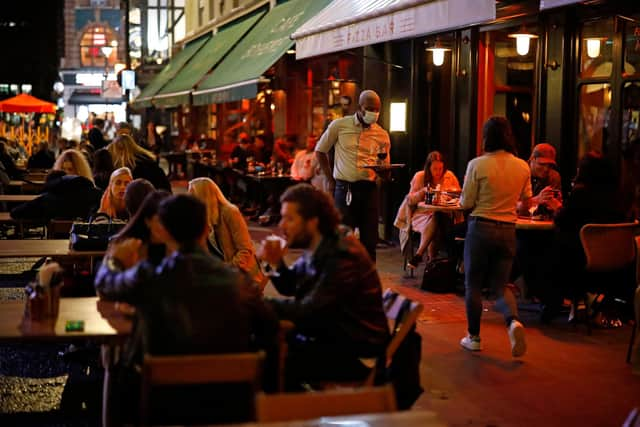UK economic growth slows as cost-of-living crisis starts to bite
The Office for National Statistics (ONS) said gross domestic product (GDP) increased just 0.1 per cent in February, compared to a rise of 0.8 per cent in January, and below the 0.3 per cent rise predicted by economists.
Growth was seen in the hospitality and leisure sectors as Omicron infection numbers eased compared to December and January. But GDP was hit as government spending on the NHS test and trace system and Covid-19 vaccination booster programme slowed in February.
Advertisement
Hide AdAdvertisement
Hide AdThere were also slowdowns in construction industries as business confidence took a knock, with the cost-of-living crisis and high energy bills leaving bosses uneasy about making significant investments.
Suren Thiru, head of economics at the British Chambers of Commerce, said: "While economic output continued to rebound in February, the significant slowdown in growth indicates that the UK economy was losing steam even before the impact of Russia's invasion of Ukraine.
"Tourism-related industries and accommodation services recorded the strongest improvements in the month as the end of Plan B restrictions, and reduced concerns over Omicron, supported activity.
"However, this was mostly offset by a significant drop in NHS Test and Trace services and vaccine activity as well as declines in industrial and construction output.


"February's slowdown is likely to be the start of a prolonged period of considerably weaker growth as rising inflation, surging energy bills, and higher taxes increasingly damage key drivers of UK output, including consumer spending and business investment."
The key driver of growth for the economy in February came from the services sector – up 0.2 per cent – with the ONS saying there were increases in travel agency, tour operator and other reservation services, which grew by 33.1 per cent on the month.
Accommodation and food services were up 8.6 per cent in February, with healthy growth in hotel bookings as the Omicron variant faded and people tried to get away. The biggest negative contributor in consumer-facing services was the motor industry, with sales of cars and repairs down.
This also affected car factories, which decelerated, along with falls in the manufacturing of computers and other electronics, where chip shortages continue to bite.
Advertisement
Hide AdAdvertisement
Hide AdOverall, services are now 2.1 per cent above pre-Covid levels with construction up 1.1 per cent. But production is now 1.9 per cent below pre-pandemic levels.
Slowing
Alpesh Paleja, Confederation of British Industry lead economist, said: "Following the bounce at the start of the year, it's no surprise that economic growth slowed in February.
"Near-term challenges to the outlook have ramped up since, with a growing cost-of-living crunch set to weigh on growth.
"Businesses are also grappling with headwinds from the Ukraine conflict, which is exacerbating cost pressures and supply-chain disruption."
Chancellor Rishi Sunak said: "I welcome the positive growth seen across the economy in February, which continues to recover from the pandemic, boosted by the support we provided.
"Russia's invasion of Ukraine is creating additional economic uncertainty here in the UK, but it is right that we are responding robustly against Putin's unprovoked invasion."
A message from the Editor:
Thank you for reading this article. We're more reliant on your support than ever as the shift in consumer habits brought about by coronavirus impacts our advertisers.
If you haven't already, please consider supporting our trusted, fact-checked journalism by taking out a digital subscription.
Comments
Want to join the conversation? Please or to comment on this article.
